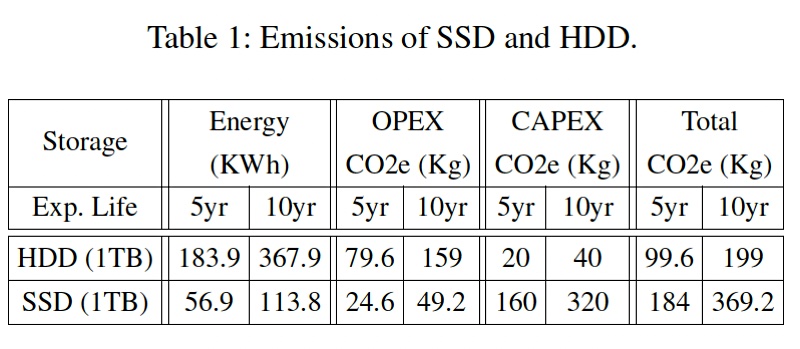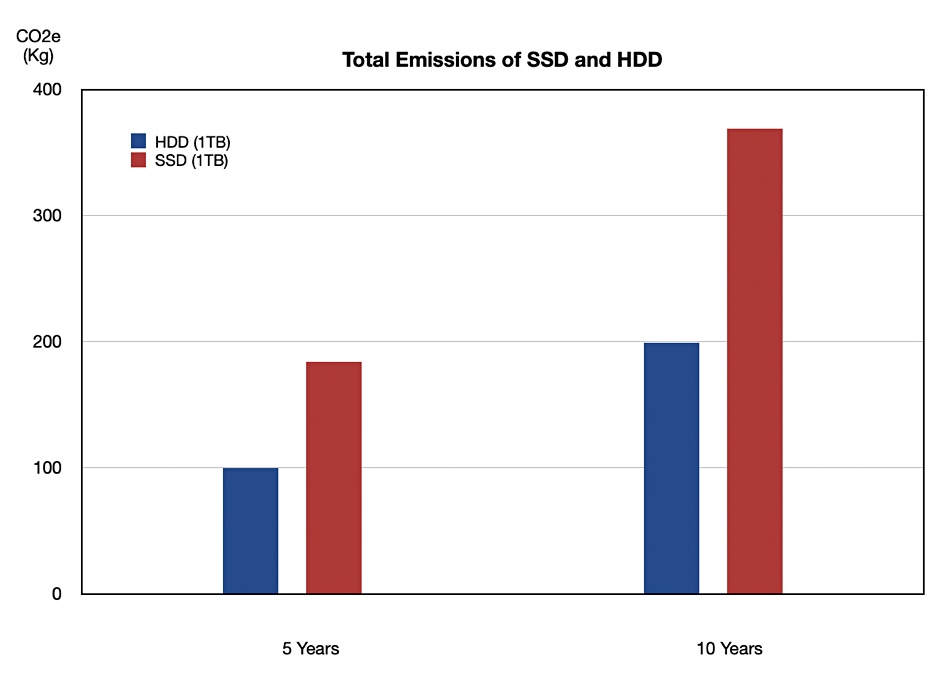Research house Futurum has backed a recent research paper that suggests HDDs could be greener than SSDs. The paper states that the biggest carbon emissions happen at the time of manufacture, with production of SSDs creating more carbon than disk drives.
In a research note “Are SSDs really more sustainable than HDDs?” Futurum analyst Mitch Lewis claims “the manufacturing process for the flash devices used in SSDs is highly energy-intensive [which is] about 8x higher embodied cost compared to Hard Disk Drives (HDDs) with an identical capacity.”
He is referencing a recent study presented at HotCarbon 2022 titled “The Dirty Secret of SSDs: Embodied Carbon,” co authored by University of Wisconsin–Madison comp sci prof Swamit Tannu, and Prashant J Nair, an assistant comp sci professor at the University of British Columbia.
The study claims: “Manufacturing a gigabyte of flash emits 0.16 Kg CO2 and is a significant fraction of the total carbon emission in the system… the flash and DRAM fabrication centers have limited renewable electricity supply, forcing fabs to use electricity generated from carbon-intensive sources.” This 0.16kg CO2 is the embodied carbon cost of SSDs.
Despite being physically bulkier, “compared to SSDs, the embodied carbon cost of HDDs is at least an order of magnitude lower.” This is because HDD manufacturing is much less semiconductor-intensive than SSD fabrication and semiconductor manufacturing needs more electricity than HDD manufacturing. Also, “most semiconductor fabrication plants rely on the electricity generated by coal and natural gas plants” rather than renewable sources.
Deciding how green an SSD or HDD is isn’t simply a matter of assessing its operational electricity usage and “one must account for the embodied [carbon] cost when deciding on the storage architecture.”
The study assesses and compares the lifetime emissions of HDDs and SSDs, with five-year and 10-year life span periods, in a table:

CO2e is the emitted carbon cost in kilograms. We charted the total lifetime HDD and SSD emissions numbers (rightmost two columns) to show the result graphically:

According to this study, HDDs also emit less carbon during manufacture and their operational life than SSDs, and are thus more acceptable from an environmental view point.
Some caveats:
- The study assumes average HDD power consumption to be 4.2W, whereas SSD consumes 1.3W power.
- The opex (operational life) CO2e number uses a total energy consumption emission factor specified by the US EPA – 0.7kg/kWh from 2019 data.
- The capex is the embedded carbon cost from manufacturing.
- The 10-year calculation has a capex upgrade cost as both SSD and HDD are assumed to have five-year lifetimes.
Lewis writes: “The common thought is that SSDs are generally more sustainable than HDDs because they are more power efficient, primarily due to the lack of moving parts. This energy efficiency argument is heavily used in vendor marketing, specifically from storage vendors selling all-flash storage systems.”
But the research study changes things. “This is a fairly surprising result. The vast majority of vendors claim that SSDs are far more sustainable than HDDs, yet this report seems to show otherwise.”
Lewis suggests the authors may not have considered that “the technology refresh cycles of HDDs and SSDs have grown apart… A 4- or 5-year refresh cycle… is what is typically used for HDDs… [Longer vendor warranties] are allowing IT organizations to keep SSD devices for up to 10 years.”
Making that assumption gives the SSD a 10-year carbon cost of 209.2kg CO2e, which is much closer to the HDD figure, though still in excess of it.
As SSDs increase their capacity (density) faster than HDDs “this difference in density may allow IT organizations to reduce their overall physical footprint, and therefore total emissions [and this] would make up for the difference between HDD and SSD emissions.”
“Still, the difference in the sustainability of SSDs and HDDs is likely much closer than many flash storage vendors would like to admit.” But in the future “denser devices that provide significant footprint consolidation may also improve the total carbon emissions in the datacenter,” meaning SSDs.








